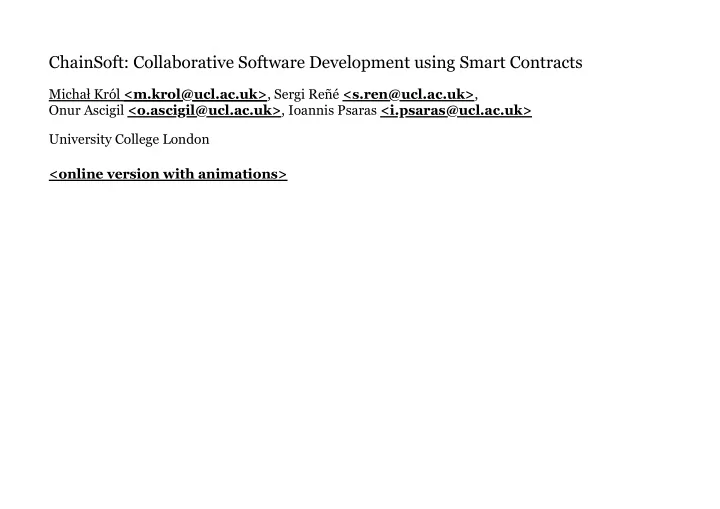

ChainSoft: Collaborative Software Development using Smart Contracts Michał Król <m.krol@ucl.ac.uk> , Sergi Reñé <s.ren@ucl.ac.uk> , Onur Ascigil <o.ascigil@ucl.ac.uk> , Ioannis Psaras <i.psaras@ucl.ac.uk> University College London <online version with animations>
Outsourcing Software Development Outsourcing Software Development Already huge and growing market 99% being small and medium-sized firms with under 500 employees New technologies emerge every single day Smaller companies cannot keep a team of developers with expertise in wide range of domains
Outsourcing software development can be difficult Outsourcing software development can be difficult Finding the right specialists Specifying the requirements Sticking to the schedule Trust issues (Fair Trade problem)
Chainsoft Overview Chainsoft Overview Automate outsourcing software development Well defined requirements and rewards Test Driven Model Assures fair exchange Encourages open source software development
Background Background
Blockchain Technologies Blockchain Technologies Smart Contracts Allow to logic on top of a blockchain Turing complete language (Solidity) Submitted data is publicly visible Oracle Smart Contracts have now knowledge about external world Oracles provide a trusted data feed Return data and a proof (data attestation) Oraclize queries HTTPS servers and uses TLSNotary to generate proofs
Github and Travis CI Github and Travis CI Github The most popular web-based hosting service for version control using Git. Commonly used to host open-source software projects Travis CI Continous Integration Tests software in a user defined environment Docker Based
Overview Overview
Environment Environment Requester Software Developer Payment System Oracle
Assumptions Assumptions Any developer can work on submitted tasks, but only the first valid solution will be rewarded The Requester and the Developer mutually distrust one another Both the Requester and the Developer trust the blockchain and the oracle Users can increase reward for a task even if they do not own it
Chainsoft Chainsoft
Code Verification Code Verification In order to verify a solution we need to: Compare if the included tests are the same as the ones submitted by the requestor. Recreate the specified environment and compile the whole project. Run the tests against the submitted solution. ...but running multiple tasks within a smart contract is expensive.
Code Verification Code Verification We create a checksum file containing a list of all the test and their checksums. The checksum of the checksum file is stored in the environmental file When a solution is submitted, the Smart Contracts verifies only one single environmental file Travis CI uses the checksum file, to verify correctnes of all the tests
Code Verification Code Verification Created the must prevent creating dummy software satisfying the tests only Different level of tests (unit/integration/...) Random or fetched input Tests should not rely on external data sources unless they are trusted by both the developer and the requester
Results Results
Results Results Event Ether Slow Ether Standard Ether Fast deploy 0.057$ 6.324$ 16.673$ submitTask 0.013$ 1.267$ 3.675$ addReward 0.002$ 0.241$ 0.698$ submitSolution 0.007$ 0.662$ 1.919$ Total per task 0.022$ 2.17$ 6.292
Conclusion Conclusion New platform for secure outsourcing software development Allows any user to submit tasks or solutions and enforces users’ proper behaviour using Smart Contracts and trusted oracles Secure against rational adversary Future Work Outsourcing without making the code public Oracles using Trusted Execution Environments
Thank you Thank you
Recommend
More recommend